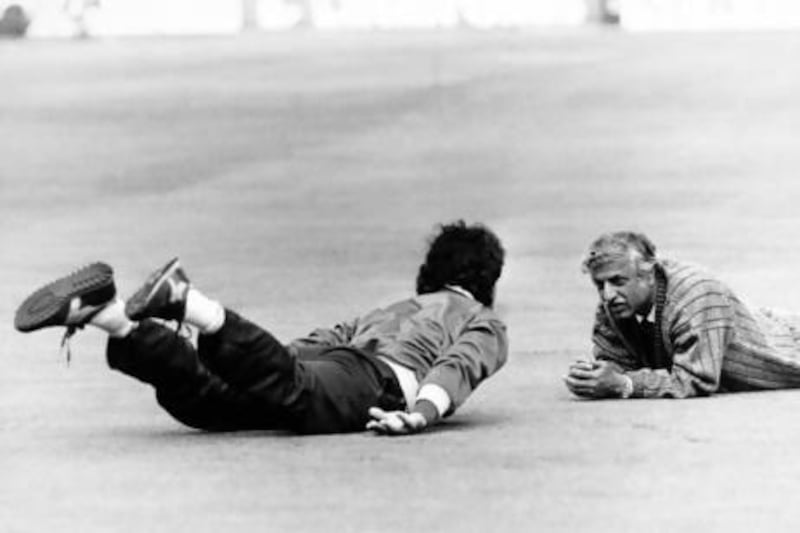Had Haseeb Ahsan been born in 1979 and not 1939, who knows how big an off-spinner he might have become?
Maybe he would not have amounted to much more, but there is a fair chance that at the very least he would have played more than the 12 Tests he eventually did.
Ahsan, who died over the weekend, was one of the lesser-heralded victims of the hissy fit cricket underwent in the 1960s over chucking, one of the game's periodic bouts of generally ill-judged hyper-morality.
During the early part of that decade bowlers accused of chucking were not just chuckers. They were sinners and moral transgressors. Their careers were not just brought to an abrupt end; they were hounded out of the game and society like lepers.
They were still decades from being understood as possible biological kinks (and not even kinks according to the ICC research in 2004 that found pretty much all bowlers to be some degree as chuckers).
Fortunately, Ahsan did not undergo the kind of harassment Geoff Griffen and Ian Meckiff had to. But the downside of that was that he left the England tour of 1962 before the Test series even began, an injured ankle the official reason but fears over his action the actual one.
He never played another Test and only eight more first-class games, a startlingly abrupt end to Pakistan's brightest spinning talent in the early years.
There should not be any doubt that he was. In many ways it is easy to imagine Ahsan as a precursor to the modern Pakistan off-spinner. He was quickish and a big turner of the ball to all eyes, not least his own, immodest ones.
"I can turn the ball almost at right angles on matting wickets and I believe I can turn more than many others bowlers even on easy and firm turf wickets," he said in a book on Pakistan's tour to the West Indies in 1959, his first.
But it was the jerk in his action that makes the idea of him as a prototype easiest to digest, given the high number of Pakistani off-spinners whose actions have been scrutinised over the past decade.
That there was a problem was widely acknowledged. An Indian umpire had no-balled him in a Test. On that England tour the question of his action became public.
His captain, Javed Burki (the pair never got on), thought something was not right about it. Even his closest allies, Hanif and Mushtaq Mohammad, concede there was a jerk but like many others, both feel, the handling of his end was poor.
Today, who knows? He would undoubtedly have benefited from more nuanced and sympathetic handling. But conversely, if he was playing today, his off-field role and impact in the late 1970s and 1980s would have been lost.
In his obituaries, wire reports and much of the press referred to him as a former chief selector, which is about as inadequate a summation of his post-playing role as can be (he was credited with first selecting Wasim Akram but Akram has many claimants and picking him, given his talent, was a straightforward selection).
At one point in the 1980s Ahsan was the overlord of Pakistani cricket, so powerful official designations did not matter.
He fixed problems, managed tours, was a spokesman, headed any number of committees (but not in the bland, unfeeling way Intikhab Alam heads every committee now), got involved in big disputes, organised a World Cup and yes, when needed, selected sides.
Scyld Berry got close to it in his account of England's 1987/88 tour inside Shakoor Rana's ego, Cricket Odyssey, not naming Ahsan but referring to a "Grand Vizier" who "believes that the end of a Pakistan victory justifies all means".
That is probably too Orientalist an interpretation but the basic idea of his capacity to orchestrate is not far off. At that point, in that series and particularly in those battles with England which were about far more than just cricket, Ahsan's basic anti-establishment standpoint was necessary to ensure Pakistan's ascent as a power.
In fact, just as with his off-spin, it is possible to see some mould forming in his boardroom stances.
The arch-instigating, the contrariness, the riling of old powers, the sharp eye for commercial opportunity; Ahsan was like a BCCI (Board of Control for Cricket in India) administrator 10 years before the BCCI started becoming this BCCI.
It ensured his own demonisation outside of Pakistan (and sometimes within). He could be mischievous for sure and he was not always right.
But he is precisely the kind of man Pakistan could really do with now, one who fought his own corner fiercely and sometimes, fortuitously, that corner happened to be the same one Pakistan were parked in.
Follow us
[ @SprtNationalUAE ]





